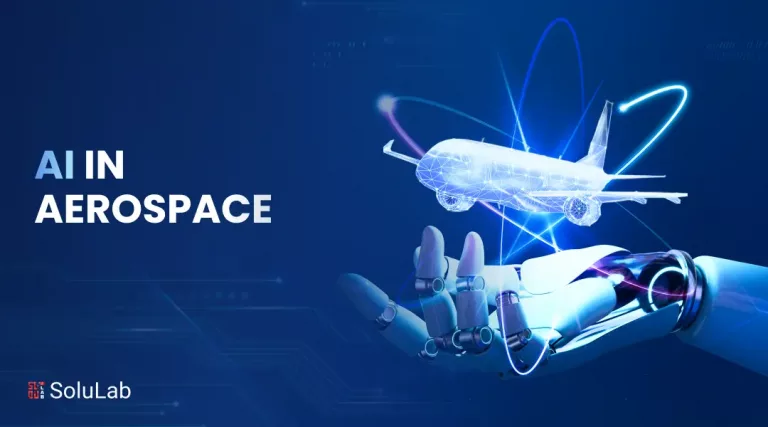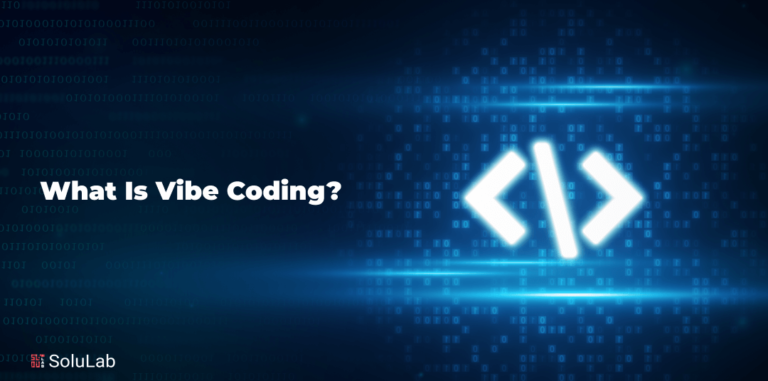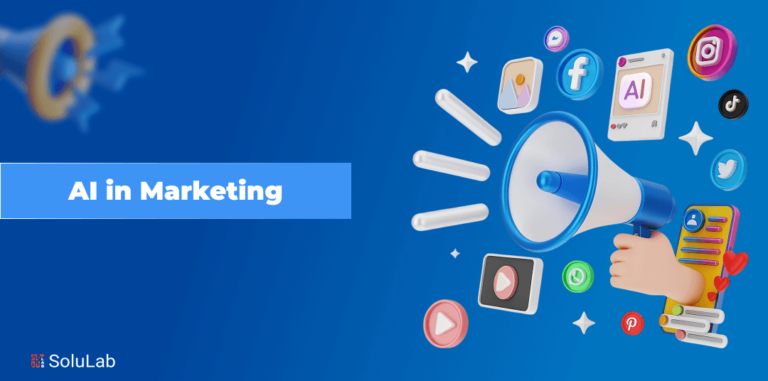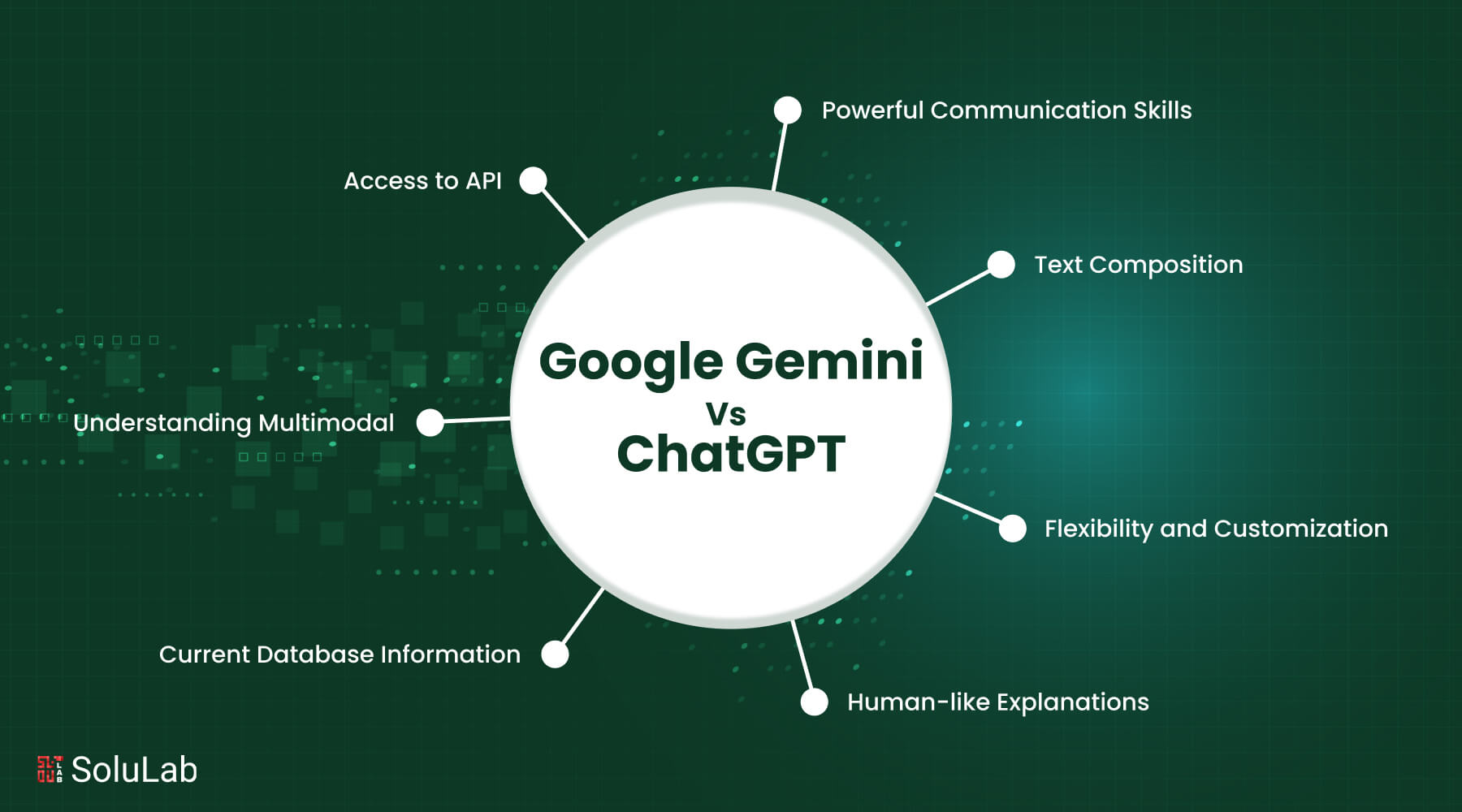
Over the past few years, generative AI has dominated the tech sector more than anything else. The first step was the introduction of OpenAI’s ChatGPT, which astounded users with its capacity to create text and respond to queries on nearly any subject in the globe.
Since that time, AI has taken over Silicon Valley, leading some of the largest tech companies to develop their own Large Language Models (LLMs) in an attempt to capitalize on ChatGPT’s growing user base.
Among these LLMs is Google’s Gemini, which debuted as Bard at the beginning of 2023 and has since become as one of the top ChatGPT substitutes available today.
However, how does ChatGPT and Gemini compare? In order to determine which ChatGPT vs. Gemini is superior in 2024, this blog compares and contrasts their features, benefits, and drawbacks.
What is ChatGPT?
ChatGPT is a large language model (LLM) that can have discussions and respond to user inquiries on any subject since it was trained on an enormous amount of text and code from the internet.
The AI chatbot, created by OpenAI, has the ability to produce writing of human caliber, translate across languages, create a variety of artistic output, and—above all—have lively discussions on a range of subjects.
ChatGPT is a large language model (LLM) that can have discussions and respond to user inquiries on any subject since it was trained on an enormous amount of text and code from the internet.
However, this does not imply that ChatGPT is the greatest chatbot available; rather, it only indicates that it is the oldest, and that can occasionally be a good thing. Today are a lot of chatbots out today with features comparable to ChatGPT since many other chatbot providers have now taken OpenAI’s GPT LLM and used it in their own, specialized chatbots.
There are two versions of ChatGPT:
- Free GPT-3.5 Version: The most commonly accessible version of GPT-3.5 is the free version, which is available to everyone via the ChatGPT website. It provides creative text production, information retrieval, and rudimentary conversational skills using the GPT-3.5 language model.
- Paid GPT-4 Version (ChatGPT Plus): Similar to the free version, this premium edition has more features and functionalities. It makes use of the stronger GPT-4 language model.
Important ChatGPT Features
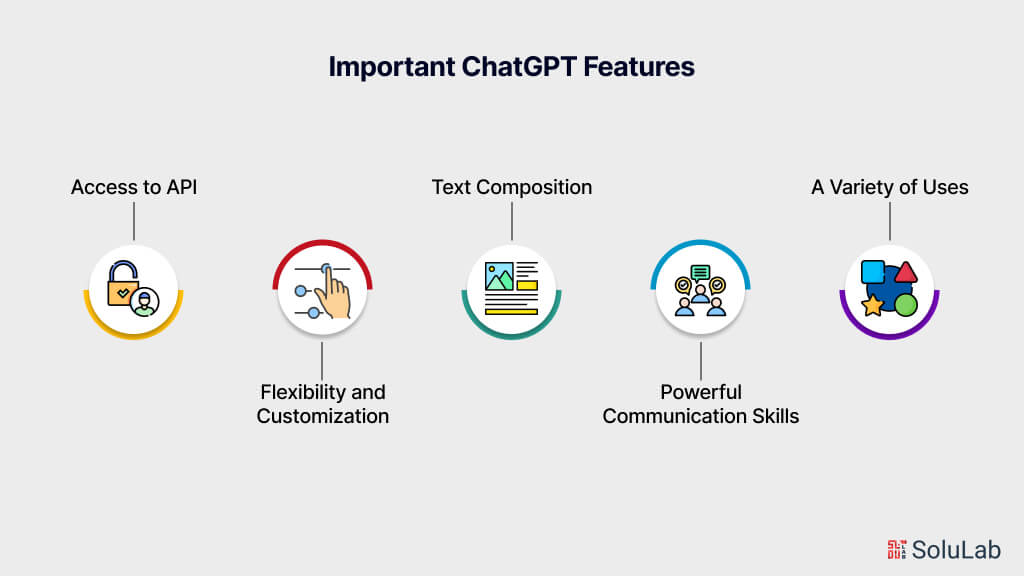
OpenAI ChatGPT offers an array of functionalities to facilitate question-answering, content creation, and user communication. Among its noteworthy features are:
1. Powerful Communication Skills
With its strong natural language processing (NLP) engine, ChatGPT development excels in conducting discussions that sound natural. It may replicate human contact by responding to your questions in a manner and tone that suits the situation. Consider it your talkative, intelligent friend with whom you may share ideas.
2. Text Composition
With ChatGPT, you may generate a variety of creative text formats, including emails, letters, screenplays, poetry, and music. If you give it precise directions or suggestions, it will create interesting and engaging writing.
3. A Variety of Uses
The possibilities of ChatGPT go beyond straightforward dialogue. It can compose various forms of creative material, translate across languages, summarize facts, and even provide you with an intelligent response to open-ended, difficult, or unusual inquiries.
4. Flexibility and Customization
ChatGPT’s capacity for learning and adaptation is one of its main advantages. It gets a better understanding of your preferences and communication style the more you use it. Over time, more pertinent and meaningful interactions may result from this customization feature.
5. Access to API
Make use of ChatGPT’s capabilities by integrating it into your own projects and apps with the help of OpenAI’s open-source API. Because of this, it is very flexible and usable by both developers and end users.
What is Gemini?
Google created Gemini, an AI-powered chatbot that can converse and produce text that appears human in answer to a variety of queries.
The chatbot, which was first introduced in February 2023 under the name Bard and has since changed its name to Gemini, has drawn a lot of attention for its capacity for understanding, reasoning, and problem-solving in a variety of fields.
Gemini’s multimodality is one of its main advantages. Google app Gemini is intended to comprehend and interpret information from several modalities, including text, code, and even silent movies, in contrast to many AI models that have only been trained on text. This enables it to understand intricate ideas and carry out activities that were before difficult for AI.
Three versions of Google Gemini app are accessible:
- Gemini Ultra: The most advanced model, Gemini Ultra, is perhaps the one with the highest processing power and capabilities. Consider it a powerful V8 engine designed to tackle tough jobs.
- Gemini Pro: Power and efficiency are well-balanced in this edition. Much like a dependable V6 engine, it’s probably appropriate for a variety of applications.
- Gemini Nano: This is probably the least resource-intensive and lightest variant. Think of it as a 4-cylinder engine that uses less gasoline and is excellent for jobs that don’t need the maximum power of the other types.
Important Gemini Features
Gemini has a wide range of functions to provide you with accurate and pertinent answers to your questions. Among these features are:
1. Understanding Multimodal
In contrast to many text-only AI models, Gemini is highly adept at analyzing data from several sources. This comprises:
- Text: Producing and comprehending text that is human-like for activities like question-answering, translation, and summarization.
- Code: Examining codebases, spotting possible problems, offering fixes, and providing programmers with an explanation of the reasons behind them.
- Visuals: Interpreting silent movies, deducing themes and storylines, and even identifying items and their relationships in pictures.
2. Current Database Information
In order to provide your replies, Gemini continually scans webpages, indexing and analyzing data in real-time. This eliminates the need for you to wait for the AI algorithms to catch up and gives you access to the most recent information and breaking news as soon as it happens.
3. Human-like Explanations
Gemini does more than simply provide you with answers; it also explains them in simple, understandable terms. Gemini’s sophisticated natural language processing (NLP) skills enable it to understand the context and underlying meaning of your inquiries. This enables it to deliver outcomes that are more insightful and relevant, especially for difficult or open-ended inquiries.
Key Differences Between Google Gemini vs. Open AI ChatGPT
Here are the key differences between Google Gemini vs Open AI ChatGPT:
| Parameters | Google Gemini | OpenAI ChatGPT |
| Functionality and Capabilities | Google Gemini is Google’s latest advancement in natural language processing (NLP) and conversational AI. It employs advanced machine-learning techniques to generate human-like text responses based on provided prompts. Beyond simple text generation, Gemini can comprehend context, generate multi-turn conversations, and seamlessly integrate with other Google products and services. Its capabilities encompass language understanding, context preservation, and the generation of diverse and contextually relevant responses. | OpenAI ChatGPT, built on the Generative Pre-trained Transformer (GPT) architecture, specializes in generating text-based responses in conversational settings. It excels in understanding natural language inputs and producing human-like text outputs across a wide spectrum of topics and conversational contexts. ChatGPT offers flexibility through fine-tuning models for specific use cases or domains, enabling customized responses tailored to individual needs. |
| Performance and Accuracy | Google Gemini aims for high levels of accuracy in understanding and generating natural language text. Through extensive training on large datasets and sophisticated algorithms, Gemini endeavors to provide accurate and contextually relevant responses to user queries. It undergoes rigorous evaluation and testing procedures to ensure the quality and reliability of its outputs. | OpenAI ChatGPT has garnered widespread acclaim for its impressive performance and accuracy in generating human-like text responses. Trained on vast amounts of text data from the internet, ChatGPT exhibits a strong understanding of language nuances and context, enabling it to produce coherent and contextually appropriate responses. While occasional errors may occur, ChatGPT’s overall performance is commendable, with users often praising its ability to engage in meaningful and lifelike conversations. |
| Ease of Integration and Deployment | Google Gemini offers various integration options for developers and businesses seeking to incorporate its capabilities into their applications or platforms. With access to Google’s suite of developer tools and APIs, integrating Gemini into existing workflows or applications is relatively straightforward. Additionally, comprehensive documentation, tutorials, and support resources provided by Google facilitate the deployment and integration process for developers of all skill levels. | Integrating ChatGPT into applications or systems is typically achieved through its API, which allows developers to send text prompts to the model and receive generated responses in return. OpenAI provides clear documentation and code examples to guide developers through the integration process, making it accessible to a wide range of users. Furthermore, pre-trained versions of ChatGPT are available for quick deployment, while advanced users can fine-tune models for specific use cases or domains using transfer learning techniques. |
| Cost-effectiveness and Scalability | The cost-effectiveness of Google Gemini depends on factors such as usage volume, resource requirements, and any associated licensing fees. Google may offer flexible pricing models tailored to different use cases and customer needs, allowing businesses to scale their usage of Gemini accordingly. Additionally, integration with other Google products and services may provide cost-saving opportunities for organizations already invested in the Google ecosystem. | OpenAI offers several pricing plans for accessing ChatGPT’s API, ranging from free tiers for limited usage to paid subscriptions for higher volumes of requests. The cost-effectiveness of using ChatGPT depends on factors such as usage frequency, complexity of requests, and additional features or support services required. While scaling usage of ChatGPT to accommodate growing demand is generally feasible, organizations should consider potential costs associated with increased usage and plan accordingly. |
| User Feedback and Reviews | User feedback and reviews for Google Gemini may vary based on factors such as implementation quality, user experience, and overall satisfaction with the product. Positive reviews often highlight Gemini’s ability to generate accurate and contextually relevant responses, ease of integration with other Google services, and overall performance in real-world applications. Negative feedback may point out limitations or areas for improvement, such as occasional errors in response generation or challenges in fine-tuning the model for specific use cases. | ChatGPT has received widespread acclaim from users, developers, and businesses for its impressive performance and versatility. Positive reviews emphasize ChatGPT’s ability to understand natural language inputs, produce coherent and contextually appropriate responses, and engage in meaningful conversations across various topics and domains. While some users may encounter occasional inconsistencies or limitations, the overall consensus is overwhelmingly positive, with many considering ChatGPT to be a game-changer in the field of conversational AI. |
Future Outlook for Google Gemini and Open AI ChatGPT
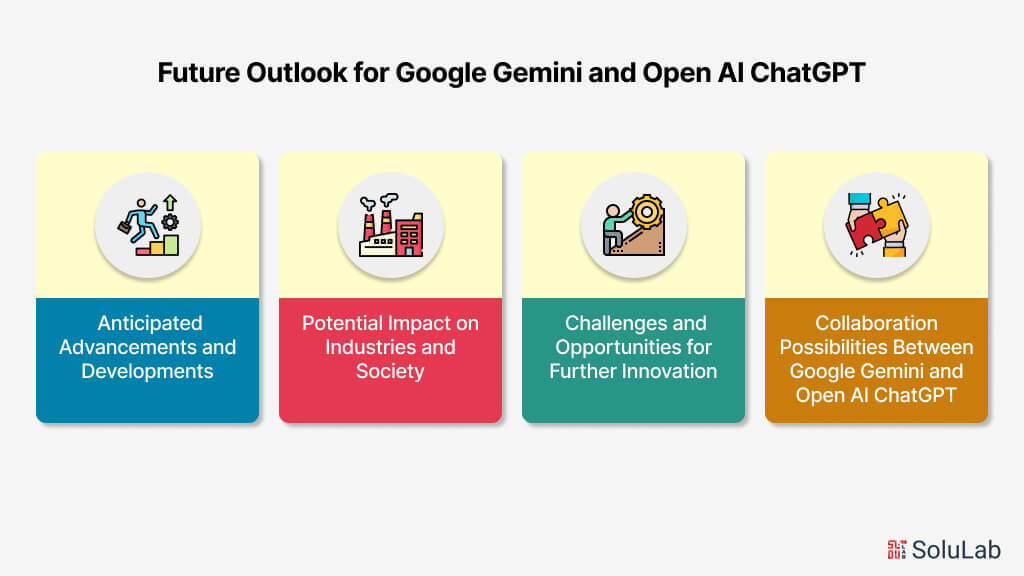
In the future, Google Gemini and ChatGPT are expected to continue pushing the boundaries of natural language processing applications and conversational AI, ushering in a new era of human-computer interaction. Here are some future trends you can expect with Google Gemini and Open-AI ChatGPT.
A. Anticipated Advancements and Developments
Both Google Gemini and ChatGPT are undergoing significant advancements and developments in innovation and technological evolution. Here’s a glimpse into the potential future trajectories for these modern AI systems:
With Google Gemini:
- Continued advancements in natural language processing (NLP) capabilities, including improved understanding of context and nuanced language nuances.
- Integration of Gemini with other Google services and platforms for enhanced user experiences and seamless interactions.
- Exploration of advanced AI techniques such as reinforcement learning to further refine and optimize Gemini’s conversational abilities.
Regarding Open AI ChatGPT:
- Further refinement of model architectures and training methodologies to enhance performance and generate more contextually relevant responses.
- Development of specialized versions of ChatGPT for specific industries or use cases, catering to diverse needs and requirements.
- Exploration of novel techniques such as few-shot or zero-shot learning to enable ChatGPT to adapt to new tasks and domains with minimal training data.
B. Potential Impact on Industries and Society
The potential impact of Google Gemini and ChatGPT extends far beyond their immediate applications, with profound implications for industries and society at large. Here’s a look at the transformative effects these technologies may have:
Google Gemini’s Impact:
- Revolutionizing customer service and support through AI-powered chatbots capable of handling complex queries and providing personalized assistance.
- Transforming content creation and marketing by enabling automated generation of engaging and relevant content across various platforms and channels.
- Facilitating knowledge dissemination and accessibility through conversational interfaces that make information more easily accessible and digestible.
Open AI ChatGPT’s Impact:
- Redefining human-computer interactions by enabling more natural and intuitive communication with AI systems.
- Empowering individuals and businesses to leverage artificial intelligence for various tasks, from writing assistance to decision support and creative expression.
- Addressing societal challenges such as language barriers and information overload by providing AI-driven tools for communication, translation, and information synthesis.
C. Challenges and Opportunities for Further Innovation
While the future looks promising for Google Gemini and ChatGPT, there are several challenges to overcome and numerous opportunities to explore. Here’s a breakdown of the key hurdles and potential avenues for further innovation:
Challenges and Opportunities for Google Gemini:
- Addressing biases and ethical considerations inherent in AI systems, particularly in sensitive or high-stakes domains. Expanding Gemini’s capabilities to support additional languages, dialects, and communication modalities to reach a broader audience.
- Ensuring data privacy and security in the collection and processing of user interactions and personal information. Collaborating with industry partners and domain experts to co-develop specialized versions of Gemini tailored to specific industries or use cases.
Challenges and Opportunities for Open AI ChatGPT:
- Mitigating the risk of misinformation and malicious use of AI-generated content, such as fake news or deceptive marketing. Enhancing ChatGPT’s interpretability and explainability to improve user trust and understanding of AI-generated responses.
- Addressing limitations in understanding and generating nuanced or complex language expressions, particularly in specialized domains or cultural contexts. Using advances in multimodal AI to enable ChatGPT to process and generate text-based responses from diverse input modalities, such as images, audio, and video.
Read Blog: Google’s Gemini AI: Capabilities and Applications
D. Collaboration Possibilities Between Google Gemini and Open AI ChatGPT
The synergies between Google Gemini and ChatGPT present exciting opportunities for collaboration and mutual reinforcement. Here’s how these two innovative technologies could join forces to drive innovation and create new possibilities:
- Integration of ChatGPT’s conversational capabilities into Google Gemini’s ecosystem, enhancing its ability to engage in natural and fluid interactions with users.
- Utilizing Google’s vast resources and infrastructure to accelerate the development and deployment of ChatGPT models and services.
- Collaborating on research and development initiatives to advance innovation in NLP and conversational AI, pushing the boundaries of what’s possible.
Which One is Better- Google Gemini or Open AI ChatGPT?
Determining which AI model, Google Gemini or ChatGPT, is better depends on the specific needs, objectives, and context of the user. Both systems have their own strengths and areas of expertise, making them suitable for different applications and scenarios.
Google Gemini stands out with its focus on analysis, reasoning, and factual accuracy. It excels in tasks such as information retrieval, problem-solving, and research, leveraging its ability to understand information from multiple sources and provide insightful responses. Additionally, its integration with Google’s suite of products and services offers seamless interoperability and access to a wide range of tools and resources.
On the other hand, ChatGPT shines in creative writing, storytelling, and generating various text formats. With its prowess in generating human-like text responses and engaging in natural conversations, ChatGPT is well-suited for tasks requiring creativity, expression, and interaction with users. Its versatility and adaptability make it suitable for a diverse range of applications, from content generation to virtual assistance.
Ultimately, the choice between Google Gemini and ChatGPT depends on factors such as the nature of the task or problem at hand, the desired outcomes, and the specific requirements of the user or organization. While Google Gemini may be preferred for tasks requiring factual accuracy and reasoning, ChatGPT may be favored for applications demanding creativity and natural language interaction. It is essential to evaluate each AI model’s capabilities, limitations, and compatibility with the intended use case to make an informed decision about which one is better suited to meet the desired objectives.
Conclusion
In conclusion, the comparison between Google Gemini and ChatGPT highlights the diverse capabilities and applications of modern AI technologies in natural language processing and conversational AI. While Google Gemini excels in analytical tasks and seamless integration with Google’s ecosystem, ChatGPT stands out for its creative writing abilities and engaging conversational skills. The choice between these AI models ultimately depends on the specific needs and objectives of the user, with each offering unique advantages for different use cases.
For businesses looking to use AI in their initiatives, SoluLab provides professional advice and development services. As an experienced AI development company, SoluLab focuses in creating personalized AI solutions that are matched to the particular needs of every customer. From conception to execution, SoluLab’s group of AI specialists works directly with customers to provide creative and significant AI solutions that promote company expansion and achievement. Get in touch with us right now to find out how SoluLab can assist you in realizing the AI potential of your projects.
FAQs
1. What is the primary difference between Google Gemini and ChatGPT?
Google Gemini focuses on analysis, reasoning, and factual accuracy, making it ideal for tasks such as information retrieval and problem-solving. On the other hand, ChatGPT specializes in creative writing and storytelling, excelling in generating human-like text responses and engaging in natural conversations.
2. How can I integrate Google Gemini or ChatGPT into my application?
Both Google Gemini and ChatGPT offer integration options through their respective APIs. Dedicated Developers can utilize these APIs to send text prompts to the models and receive generated responses in return. Additionally, comprehensive documentation and support resources are available to guide developers through the integration process.
3. What are the potential use cases for Google Gemini and ChatGPT?
Google Gemini can be applied in various industries and domains, including customer service, content creation, research, and education. It can power chatbots for personalized assistance, generate informative content, and facilitate knowledge dissemination. ChatGPT, on the other hand, can be used for tasks such as virtual assistance, creative writing, storytelling, and generating diverse text formats.
4. How do Google Gemini and ChatGPT ensure accuracy and reliability in their responses?
Google Gemini undergoes extensive training on large datasets and utilizes sophisticated algorithms to achieve high levels of accuracy in understanding and generating natural language text. ChatGPT, trained on vast amounts of text data from the internet, exhibits a strong understanding of language nuances and context, contributing to its accuracy and reliability in response generation.
5. What factors should I consider when choosing between Google Gemini and ChatGPT for my project?
When selecting between Google Gemini and ChatGPT, it is essential to consider the specific requirements and objectives of your project. Evaluate factors such as the nature of the task, desired outcomes, and compatibility with existing systems or workflows. Additionally, consider the strengths and limitations of each AI model in relation to your project’s needs to make an informed decision.




